In this post, he makes it a bit clearer who he is referring to. This hope for a priest shortage to be followed by lay pastoral leadership and the ordination of women was, he says,
shared with me with some enthusiasm in not one, but three of the Southern dioceses in England. Anyone who knows the English Church will be able to identify the three Southern Dioceses to which I am referring and I doubt if anyone will refute this proposed ‘new model’ of priesthood in England.
Well, Fr Longenecker, I know you've been out of the country for a while and may be a little out of the loop, but the following dioceses have changed hands since 2010: from the south, Plymouth, Portsmouth, Arundel and Brighton, Brentwood, Birmingham, Northampton, East Anglia... You really can't talk about any others as 'Southern Dioceses in England' apart from Westminster and Southwark, and those both had new bishops about a year before the 2010 blog post, long after these reported conversations.
Well, Fr Longenecker, I know you've been out of the country for a while and may be a little out of the loop, but the following dioceses have changed hands since 2010: from the south, Plymouth, Portsmouth, Arundel and Brighton, Brentwood, Birmingham, Northampton, East Anglia... You really can't talk about any others as 'Southern Dioceses in England' apart from Westminster and Southwark, and those both had new bishops about a year before the 2010 blog post, long after these reported conversations.
I would suggest that justice and charity both require you, Fr Longenecker, to explain to your readers that not a single one of the bishops whose views you claim to know about is still in office.
Fr Dwight Longenecker has picked up the story (earlier reported here) about a religious sister being put in charge, in some sense, of two parishes in Milton Keynes. He expresses some of the concerns I and others have expressed over it, but adds something from his personal experience: an anecdote about a conversation he had many years ago with a senior priest in a particular diocese in England, who had suggested that having fewer vocations would have the advantage of forcing Rome's hand on ordaining women, through the intermediate step of female lay parish administrators.
No doubt that conversation took place as described. We've all heard stories like that. What came as a bit of a surprise is the way Fr Longenecker concluded his post.
I do not criticize my fellow Catholic clergy by name, but I will say here and now that the ten years I spent as a Catholic layman in England–working close up with the Catholic hierarchy makes me not surprised or shocked at all by this behavior.
Clergy can be devious and manipulative and secretive at times, and often they have a good reason to play their cards close to their chest, but a few members of the Catholic hierarchy in England and Wales (those Damien Thompson calls “the magic circle”) are the most secretive, devious, duplicitous and schemingly oily inside operators I have ever come across.
This article is typical of their behavior.
Now, there is a lot to be said about this. I feel confident, in saying it, that since he feels able to describe Successors of the Apostles as secretive, devious, duplicitous and schemingly oily inside operators, Fr Longecker won't mind a little fraternal correction from me.
First off, Why not name them? I think it would be less damaging to the reputation of our bishops if he did. He leaves the accusation hanging in the air like a miasma. When Damian Thompson (note the spelling, Fr L) coined the term 'Magic Circle' back in the glory days of his blog, he gave a few clues as to who he was talking about. One was that Archbishop Nichols, as he then was, was not a member (and therefore Damian supported his promotion from Birmingham to Westminster); another was that these bishops, or some of them, could be found on the South coast. Since then, every diocese from Penzance to Dover has had a new bishop. In all simplicity I really have very little idea who these 'Magic Circle' bishops are today, even supposing that the term ever referred to something real. Fr L is making a very, very damaging allegation against certain English Bishops. He at least owes it to the innocent ones - if he thinks there are any - to let them off the hook.
2. Part of the same agenda would logically be the ordination of married men. The situation of Anglican convert clergy would provide ideal cover to advance this idea. What we have found, on the contrary, is that both in the early 1990s and again today, our bishops have been rather cautious about it. There may be all sorts of considerations at work here, of course. But a single-minded attempt to undermine the classical Western conception of the priesthood, it isn't.
Fr Longenecker, Michael Rose and other neo-conservatives need a conspiracy to explain the crisis in the Church, they need to blame wicked individuals: the secretive, devious, duplicitous and schemingly oily inside operators. Why? Because they don't want to blame the liturgical reform. For this reason traditional Catholics have less reason to appeal to conspiracy theories than the conservatives. The effects of the liturgical reform are, of course, extremely complex, but it is at least all in the open. We can look at the texts; we can look at the intentions of the creators of the texts as expressed in their writings; we can look at the experience of Catholics in the pews before and after. I do a lot of that on this blog. I don't think that the reformers set out to destroy the Church, but I do think that a lot of what happened was misguided and has undermined aspects of the Faith essential to vocations, among other things. How are you going to attract men to the priesthood if the liturgy has been feminised? If the role of the priest has been rendered less clear? If the sacredness of the liturgy is no longer manifested? If the presence of Our Lord on the Altar in the Blessed Sacrament is no longer recognised in a thousand ways by word and gesture? The inspiration of much of what I have written on these matters is, of course, Pope Benedict, who makes these kinds of arguments in the strongest terms in The Spirit of the Liturgy and elsewhere, and who said:
I am convinced that the ecclesial crisis in which we find ourselves today depends in great part upon the collapse of the liturgy, which at times is actually being conceived of etsi Deus non daretur: as though in the liturgy it did not matter any more whether God exists and whether He speaks to us and listens to us.
Support the work of the LMS by becoming an 'Anniversary Supporter'.
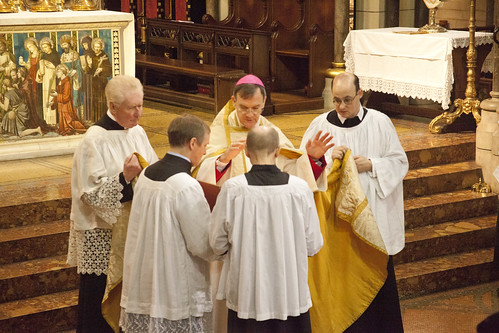 |
| Bishop John Arnold, now of Salford, at the LMS Confirmation service |
No doubt that conversation took place as described. We've all heard stories like that. What came as a bit of a surprise is the way Fr Longenecker concluded his post.
I do not criticize my fellow Catholic clergy by name, but I will say here and now that the ten years I spent as a Catholic layman in England–working close up with the Catholic hierarchy makes me not surprised or shocked at all by this behavior.
Clergy can be devious and manipulative and secretive at times, and often they have a good reason to play their cards close to their chest, but a few members of the Catholic hierarchy in England and Wales (those Damien Thompson calls “the magic circle”) are the most secretive, devious, duplicitous and schemingly oily inside operators I have ever come across.
This article is typical of their behavior.
Now, there is a lot to be said about this. I feel confident, in saying it, that since he feels able to describe Successors of the Apostles as secretive, devious, duplicitous and schemingly oily inside operators, Fr Longecker won't mind a little fraternal correction from me.
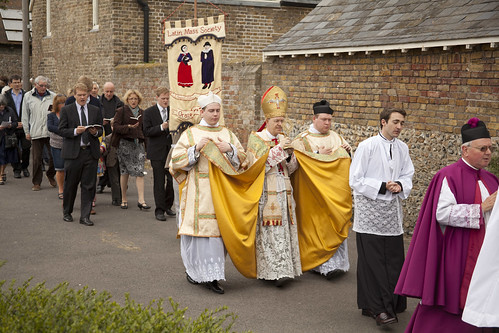 |
| Bishop Athanasius Schneider at the LMS Pilgrimage to Ramsgate |
As for the substantive issue, Fr L is proposing that the Church in England is in the grip of a vast and frankly demonic conspiracy. This is not something which should be done lightly, but he offers little evidence for it. The suggestion - which is also to be found in Michael Rose's book Goodbye Good Men - is that the vocations crisis is entirely artificial, caused by a conspiracy of bishops and seminary rectors who want to create a shortage of priests in order to promote their own vision of the Church, including women's ordination, something which is, of course, ruled out by the infallible teaching of the Church. We all enjoy a good conspiracy theory, but it won't wash.
1. If this were true, cases of religious sisters, permanent deacons, and the laity being given pastoral care of parishes would be much more frequent and would have happened long before now. Instead what we find is that our bishops have gone through every alternative option first: closing, merging, and clustering, parishes; bringing in priests from Poland and Nigeria; having 'priestless' parishes served by rotas of priests; even (and this may count as an extreme measure) inviting the Institute of Christ the King and the Oratorians of St Philip Neri to set up new places in their dioceses and giving them fine historic churches in which to do so.
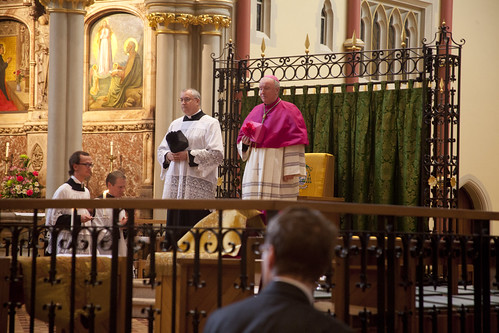 |
| Bishop Philip Egan presiding at the Traditional Mass in Portsmouth Cathedral |
3. The hard-boiled liberals who, twenty year ago, opposed the ordination of young men who folded their hands when praying, or liked the Rosary, didn't need to have the ordination of women uppermost in their minds: they had multiple reasons for disliking those men. Their being weeded out of seminaries is not, on its own, clear evidence of the rejection of the Church's teaching on female ordination. If anything, my impression from anecdotal evidence is that the liturgy and the theology of the Eucharist were the biggest sticking points. Furthermore, Fr L is suggesting that extreme liberalism is having its apotheosis right now with this appointment in Milton Keynes, but actually things are much, much better than they were 20 years ago, and if not perfect they do continue to move in a positive direction.
4. Fr L once had a conversation with a priest who said... So what? We've all met priests who like to shock and like to give the impression that everyone important agrees with them. Even what Fr L reports is no more than a thought that the shortage of vocations might have its positive effects. There were - perhaps there still are - individuals in positions of influence with peculiar views. But what is most striking about the Church in England is not the iron enforcement of a grand vision, but a healthy variation of thinking and practice. Some years ago, the then Secretary of the Bishops' Conference disarmingly informed me: 'The Bishops don't do policy'. They don't all whisper together, come up with a plan, and go off to enforce it in their dioceses. Come on, can you imagine such a thing? This is England, not the Soviet Union.
Why is someone like Fr Longenecker giving way to a conspiracy theory? Isn't it the traddies who are supposed to do that? (The ones Fr L is so rude about.) What an interesting pair of questions.
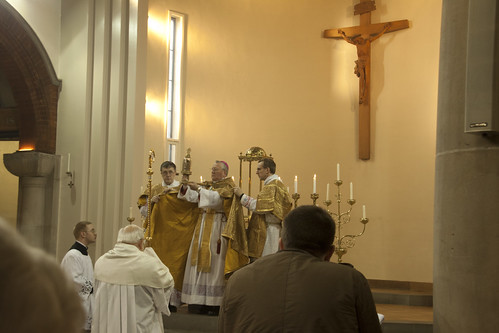 |
| Bishop Terence Drainey blessing LMS pilgrims in York with the relic of St Margaret Clitherow |
I am convinced that the ecclesial crisis in which we find ourselves today depends in great part upon the collapse of the liturgy, which at times is actually being conceived of etsi Deus non daretur: as though in the liturgy it did not matter any more whether God exists and whether He speaks to us and listens to us.
Oh no, Fr Longenecker will tell us, that's not the reason! There's nothing wrong with the reform! Taking away all those genuflections and all that kneeling, all the silent prayer and all the references to oblation, for example, would never have any affect on attitudes to the Sacrifice and Victim, and would never undermine the sense of the seriousness of the priestly role. No no, it would all have been fine, it would all have been wonderful, if it had not been for wicked, wicked, vindictive bishops and seminary rectors who had totally lost the Faith and were engaged in a vast, world-wide conspiracy, with the Freemasons, the Bolsheviks, and little green men from Mars. A vast, secret, mysterious, ruthless, conspiracy, all-pervading and all-dominating...
Come off it, Fr Longenecker. Calm down, have a cup of tea, and re-read The Spirit of the Liturgy.
Short of a couple of months, I have been Chairman of the Latin Mass Society for 6 years now. Our bishops are beginning to swim into focus for me, they are no longer, in my mind, an undifferentiated mass. I have had conversations with many of them; I have spent much time with well-informed people talking about their detailed policies. The bishops, of course, don't always do what I would like them to do. But they are not some cabal of evil people. To suggest they, or some significant group of them, are, is not only a gross offense against charity and the respect due to their office, it undermines the relationship between Bishop and people which is necessary to the functioning of the Church. It's not big, it's not clever, and it's not helpful.
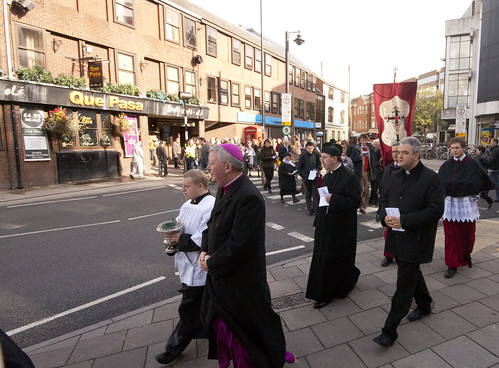 |
| Archbishop Bernard Longley leading the LMS Pilgrimage to Oxford |
There is a conspiracy. It is run by a chap called Satan. Naturally he does not let anyone else know the exact details - the need to know principle. After all if they did know they might think again. Instead he relies upon people to commit fairly trivial sins which individually may not seem serious but are just one more building block. He doesn't give a damn about their intentions or motives. Why bother with motives when each silly act or omission is one more incremental step in building his evil empire? There is lukewarmism and mugwumpery which is where the conspiracy flourishes.
ReplyDeleteI entirely agree with Nicolas Bellord on this one.Dont forget that it was a certain Pope who said that the smoke of Satan is in the Vatican!!Philip Johnson.
ReplyDeleteThank you for this post which I find very illuminating. I did read Fr. Longnecker's article and I could relate it to something which I came across in relation to New Zealand. I am not familiar with the scene in England although I do have a number of contacts there whom I trust. This article reassures me.
ReplyDeleteFor this reason traditional Catholics have less reason to appeal to conspiracy theories than the conservatives.
ReplyDeleteBut traditional Catholics love conspiracy theories!
Oh do they? Have you seen any on this blog? Or Rorate Caeli? On in the works of Michael Davies? Or anywhere else worth counting as remotely representative of the movement, as Fr Longenecker is held up as representative of the trad-bashing neo-cons?
ReplyDeleteActually this is a re-hash of a post he did on 1 Dec. 2010 when it was quite clear whom he had in his sights
ReplyDeleteI agree with your comments about the collapse of the liturgy being at the heart of the problems. However, Fr. Longenecker does have some points even though they may be a little dated now.
ReplyDeleteI was present personally at a clergy retreat when a bishop from another diocese made precisely these claims for fewer priests: it would facilitate a lay-led church. He was of the opinion that this was a good thing and many of my colleagues appeared like nodding-donkeys in agreement. That was some time ago and perhaps he does not hold these views anymore - I hope not because he is now an archbishop. There again, looking for a silver lining in a cloud is not the same thing as actively working to make the cloud materialize in the first place.
IMO the greatest test of our bishops and whether there is a demonic conspiracy among some of them, will be their collective response to the Synod on the family. There has already been material sent from Eccleston Square which implies that defenders of Catholic doctrine are Donatists. It is quite possible that this did not have the collective approval of the bishops before it was sent out, but this points to an area where there is still a serious problem : among the minions who are supposed to serve them.
Am I right in thinking that the Donatists objected to people who had apostatised but subsequently had repented? If so this is a false parallel with people who have entered second marriages irregularly and NOT repented by regularising their situation.
DeleteThere has clearly been a diabolical conspiracy at work in the seminaries and chanceries and a Holy See's administration for many decades. Its effects are so widespread and obvious, we have all experience of it - the constant attacking of Faith and morals by Church officials, through corruption of the admittance and formation, of seminarians, and at parish and diocesan levels, the destruction of the Holy Sacrifice of the Mass, other traditional liturgical practice, communal devotions, Catholic education, etc.
ReplyDelete...the suggestion - which is also to be found in Michael Rose's book Goodbye Good Men - is that the vocations crisis is entirely artificial...
ReplyDeleteIn all fairness, Joseph, I don't think that even the most outspoken advocates of this concern - we can add in Archbishop Elden Curtiss of Omaha, who first publicly mooted this alarm quite credibly - are suggesting that the crisis is entirely artificial. The extent of it is unclear, but that it might be happening in *some* places (if perhaps not quite so many as Michael Rose might think) seems to be the real contention. I don't think even the hoariest of neo-cons are completely oblivious to other maladies of the post-conciliar Church, however terrified they might be of being accused of being crypto-lefebvrists.
And that this *has* happened is not in question for me. I know men who have been in seminary who have been hit with that question from rectors, and others in a position to know. And more to the point: from both public comments and patterns of action (like jumping quickly to getting as many laywomen in charge of parishes), it's obvious that at least a solid handful of bishops attempted to do just that. The most obvious examples on my side of the Pond (to pick just two) rest with Matthew Clark in Rochester and Ken Untener in Saginaw, ordinaries who were actually rather proud of the lack of vocations under their tenure, and who never missed a chance to put a women in charge of something, anything.
All that said, I think that it is hard to disagree much with your larger thesis: given the nature of how not only the liturgy, but the entire tenor of spirituality on offer in the average western parish, to say nothing of the appalling state of most western seminaries, one hardly needs to reach for women's ordination crazed bishops to explain the collapse in vocations. In this respect, your recent series on Leon Podles on the feminization of the Church is on point. These are hapless, passive, rather feminized men, not terribly discontented with the state of affairs, more afraid of offending of the dominant pool of certain women in their shrinking parishes and chancery (and their secular allies) than of the quite obvious deleterious consequences for the long-term survival of their flocks, to say nothing of the prospects for their salvation. Because theologically, the one word that scares them most is sacrifice.
But yes, I can believe that at least a few bishops (perhaps less now than before) were actively working to ease the slipways for SS Womanpriest - and not just because more than a few bishops in W. Europe, North America and Australasia would not be unhappy if Rome were to magically, impossibly, announce that Ordinatio sacerdotalis were superseded.
Exactly. I do think the point of GGM was that this was happening and to collect the stories of men who had gone through hell trying to get through seminary, and it wasn't the kind of book to tackle the problem of the origins of the crisis in the liturgical reform. By the way, AB Curtiss personally celebrates the TLM pontifically for the FSSP seminary.
DeleteThere is a conspiracy, albeit a loose one, and it goes back a long way. It is Modernism in its various forms. Popes and bishops have tried to counter it and a surprising number of bishops, to promote it.
ReplyDeleteThis latter “Modernist” school of thought seized the chance of Vatican II, an unwise and unnecessary Council called at the wrong time, to further their version of Catholicism. Liturgical reform, which had been going on since before St Pius X, was the means they chose and it was a surprisingly effective weapon. Today, most bishops show confusion and disarray rather than malign intent, although a small group react otherwise.
This is a complex subject beyond most ordinary Catholics, including me! The roots of this go back through Jansenism to the Protestant Reformation. However, what is clear to whoever cares to stand back and look, is the result, the mess the declining Catholic Church continues to be in to the present day, in spite of the increase in nominal so-called “Catholics” worldwide.
Under Pope Francis, for whatever reason, there has been a resurgence of this Modernist line of thought. It could well lead to a new and open split. The “Silent Schism” may not remain silent much longer.
There is a very informative article explaining neomodernism at:
Deletehttp://rorate-caeli.blogspot.com/2015/01/a-christmastide-gift-for-our-readers.html
I would have thought the root of these movements is the desire to have one sins approved as not being sins - a constant in every age that does not require much explanation!
Just to clarify my comment about Satan's conspiracy the point is that one does not have to regard anyone, other than Satan, as necessarily "secretive, devious, duplicitous and schemingly oily" but rather as just foolish and unthinking. There will be the rare person who thinks he knows the devil's plans such as Hitler who, according to Bernanos, spoilt the plan by going much too fast on eugenics - a more gradualist approach is proving much more effective.
I have read this article. Quite heavy going!
DeleteThe whole Modernist movement is ultimately an attempt to deny the existence of sin. That is its Relativist component, "Imperfect Knowledge". And of course "Historical Consciousness" is but Secularism, the attempt to change the Church to the world instead of changing the world to the Church.
Yes, we live in interesting times. The danger of another Reformation is real.
Fr Longenecker is on the money, and I will give you concrete evidence of what he is saying. Google Fr John Speekman, Bishop Jeremiah Coffey, Bishop Christopher Prowse, and Into the Deep at stoneswillshout.com/wp to read about the saga. These bishops removed an orthodox priest from his parish and in effect handed it to a religious sister to run. Currently, the parish of Morwell comprises 3 churches and has an young Nigerian administrator and an Indian assistant. They do whatever Sr. Elizabeth tells them. The diocese of Sale, like many country dioceses in Australia are in the extinction phase of parish life because all these dioceses introduced pastoral plans which promoted lay leadership and ministry. Since Fr Speekman's removal in 2003 the diocese of Sale is rapidly becoming an Afro-Indian one. Many, about 80 percent of the bishops of the ACBC no longer subscribe to the traditional priesthood of Christ as it was handed down by the Apostles. These bishops were all stopped in their tracks by the sacking of the intransigent Bishop William Morris who thought he could immitate his friend,the late Bishop Coffey and treat two Vatican Congregations with contempt. Fr Longenecker is not making things up. As the saying goes, the fish rots from the head. The crisis is leadership read this month's Into the Deep, issue 145, page 7, Declining Mass Attendances - The Real Reason.
ReplyDeleteFor the Fr Speekman saga read the special August and September issue of 2003 of Into the Deep at stoneswillshout.com/wp Fr Speekman's homilies are read around the world at homiliesfromaustralia.blogspot.com.au
ReplyDelete